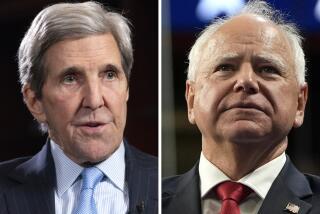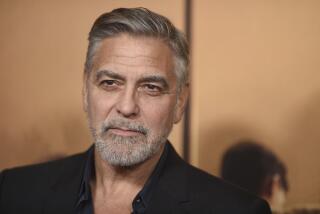Quitting Race, Clark Says He’ll Work to Boot Bush From Office
- Share via
LITTLE ROCK, Ark. — Speaking softly and appearing to fight his emotions, retired Gen. Wesley K. Clark formally departed the Democratic presidential race Wednesday, but not before pledging to do everything he could to help oust President Bush from the White House.
“Folks,” Clark told well-wishers, “this old soldier will not fade away.”
Clark decided to end his candidacy late Tuesday, after finishing third in the Tennessee and Virginia primaries. He took a bus from Memphis, Tenn., to Little Rock, his home, on Wednesday morning to make his withdrawal official.
Standing in front of four American flags, one for each of his general’s stars, Clark was joined on a stage at the Peabody hotel by his wife, Gertrude, who also spoke.
A famously strong-willed woman whom Clark likes to call “the general’s general,” she also struggled to keep her voice from cracking.
“It’s been hard to get up here today,” she said. Then, drawing cheers and hopeful looks, she said: “Someday, we may be getting together again. Who knows?”
Clark gave no indication that he might run again, nor did he endorse any of the remaining Democrats in this year’s contest.
But Clark, who registered as a Democrat only after he launched his presidential quest, stressed his commitment to continue to press the party’s case against the Bush administration.
“George W. Bush has not led America, he has misled America, time and again,” Clark said, his tone resolute as he asked the crowd of about 300 to join him in the effort to oppose Bush.
During much of his campaign, Clark focused on his own credentials and mostly refrained from criticizing his rivals. That changed recently; with his political fortunes flagging, he launched attacks on Sen. John F. Kerry of Massachusetts, the Democratic front-runner, and Sen. John Edwards of North Carolina.
But on Wednesday, he complimented them both, as well as former Vermont Gov. Howard Dean. “Our country is well-served by John Kerry, John Edwards and Howard Dean,” he said. “And I applaud them all.”
All three spoke of Clark in similarly glowing terms. Campaigning in Milwaukee, Dean called Clark “a distinguished person ... who ran a great and honorable race.”
The 34-year Army veteran launched his bid for the nomination in mid-September, more than a year after some of the other candidates. In less than five months, he raised a total of $25 million, including federal matching funds, and visited about 30 states.
His only previous bid for elective office had been for homeroom student body president, in the 12th grade. He cast his vote for his friend and rival, Steve Buchanan, Clark liked to tell audiences, and lost by one vote.
“I said, ‘Steve, I voted for you, did you vote for me?’ ” Clark told giggling audiences. “Steve said, ‘No.’ ”
A Vietnam veteran who was wounded in action, Clark served as NATO commander during the 1999 conflict in Kosovo that drove Serbian strongman Slobodan Milosevic from power. After retiring from the Army, he appeared frequently on cable TV networks as a military analyst.
Last spring, Internet-based groups began urging him to seek the presidency, arguing his military background would enable him to neutralize Bush’s credentials as a wartime president.
Clark’s campaign initially was plagued by problems, including a muddled response he gave when asked whether he would have opposed the congressional resolution in October 2002 that authorized the war with Iraq. But Clark had attracted a number of political veterans to his campaign -- including several who had worked for President Clinton -- and by late last year he was winning praise as a quick study on the campaign trail.
Still, his inexperience periodically showed itself.
In January, filmmaker Michael Moore joined Clark on a stage in Pembroke, N.H., and called Bush a “deserter,” referring to lingering questions over the president’s service in the National Guard during the Vietnam War.
Clark spent several precious campaign days defending Moore’s right to free speech, rather than swiftly distancing himself from the characterization.
After telling a New Hampshire newspaper that he opposed any restrictions on abortion, even up to the moment of birth, he was asked for days to clarify his position. He eventually said he supported Supreme Court rulings that place limits on late-term abortions.
“There’s an art and a skill to being a professional politician,” said political scientist Bruce Oppenheimer of Vanderbilt University in Nashville. Rookie candidates “make mistakes that people who have been doing it for 15 or 20 years have learned to avoid.”
Clark spent more on television advertising than any other candidate in the race during the last three months of 2003, about $10 million. But he won just a single primary, in Oklahoma, on Feb. 3.
Paid advertising simply could not compete with the momentum Kerry gained by winning the Iowa caucuses and New Hampshire primary last month, said John Geer, another political scientist at Vanderbilt.
“Kerry had all this free media suddenly,” Geer said. “Clark could have spent $20 million on advertising and it wouldn’t have made much difference.”
As many of Clark’s staff members and campaign volunteers sobbed quietly during his Wednesday appearance, Clark thanked them for their work.
“This campaign has been one of the most liberating experiences of my life,” he said.
Then, before heading to his house -- a place he had not been in nearly six weeks -- Clark offered those still in the race a bit of soldier wisdom.
“Give ‘em hell,” he said. “And never retreat.”
More to Read
Get the L.A. Times Politics newsletter
Deeply reported insights into legislation, politics and policy from Sacramento, Washington and beyond. In your inbox twice per week.
You may occasionally receive promotional content from the Los Angeles Times.










